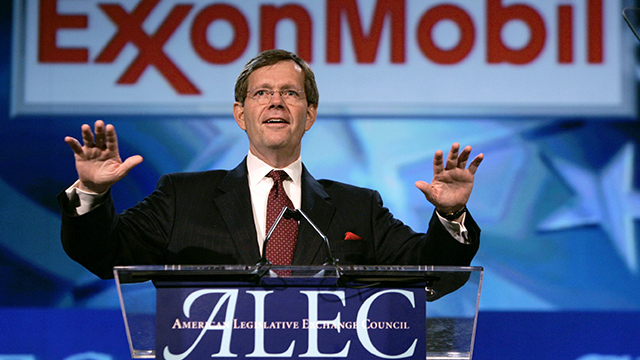
Bush administration Environmental Protection Agency Administrator Michael Leavitt addresses members of the American Legislative Exchange Council in Seattle. Behind Leavitt is a sign for the morning’s sponsor, ExxonMobil. July 2004. (AP Photo/Elaine Thompson)
Here’s a story we all now know well: A small number of groups backed by the fossil fuel industry have for decades shed doubt on the science of climate change, even as the actual scientific community consensus on the issue — that greenhouse gas pollution posed a significant threat to our climate — remained strong and continued to grow stronger.
This week, Justin Farrell, a professor at the Yale School of Forestry and Environmental Studies, released a comprehensive report in Nature Climate Change detailing just who these people opposing climate action are, where their funding comes from, and how the groups they work through are interrelated. Eric Roston reports for Bloomberg:
A loose network of 4,556 individuals with overlapping ties to 164 organizations do the most to dispute climate change in the U.S., according to a paper published today in Nature Climate Change. ExxonMobil and the family foundations controlled by Charles and David Koch emerge as the most significant sources of funding for these skeptics. As a two-week United Nations climate summit begins today in Paris, it’s striking to notice that a similarly vast infrastructure of denial isn’t found in any other nation.
The role of ExxonMobil and the Kochs in influencing climate denial hadn’t been empirically studied before now, according to Justin Farrell, an assistant professor of sociology at the Yale School of Forestry & Environmental Studies and the author of the new paper. He said the flow of money from group to group and person to person is often opaque to researchers.
ExxonMobil has maintained for years that it does not fund denial of climate change. A spokesman pointed out that the company’s $100 million founding commitment to Stanford University’s Global Climate & Energy Project was made in 2002, right in the middle of the period covered by the Nature Climate Change study. Representatives for any of the Koch family foundations could not be reached for comment.
Farrell said he focused on ExxonMobil and the Koch foundations because “they are reliable indicators of a much larger effort of corporate lobbying in the climate change counter-movement.” He examined Internal Revenue Service data showing which groups in the network of climate contrarians accepted funding from ExxonMobil or Koch foundations between 1993 and 2013. Recipients from those two sources tend to occupy central nodes in what he calls a “contrarian network.” Groups funded by ExxonMobil or the Kochs “have greater influence over flows of resources, communication, and the production of contrarian information,” Farrell wrote.
Farrell also published another study last week in the Proceedings of the National Academy of Sciences looking at how corporate funding influences the dialogue around climate change — and how the information produced by corporate-backed groups differs from that produced by groups that don’t receive special-interest money. Here’s what he found:
First, that organizations with corporate funding were more likely to have written and disseminated texts meant to polarize the climate change issue. Second, and more importantly, that corporate funding influences the actual thematic content of these polarization efforts, and the discursive prevalence of that thematic content over time.
Had these groups not done their job so effectively, world leaders might not have stalled for so long before getting serious about the kind of global emissions-cutting deal that the majority of Americans hope the Paris conference will produce. It’s late in the game at this point, with the world already one degree warmer and with poor countries already facing life-threatening effects such as drying farmland and rising seas.



